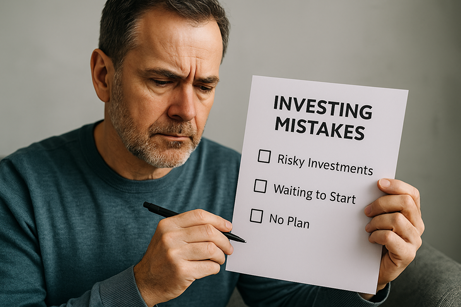Top 3 Investing Mistakes in Your 50s — and How to Avoid Them
Investing Mistakes in Your 50s
Reaching your 50s can feel like a financial crossroad. Maybe you’ve raised kids, paid off debt, or simply spent years focusing on everything but retirement. Now, suddenly, the clock feels louder—and faster. That sense of urgency is completely valid. The good news? Even if you’re starting late, you still have time to make progress.
But here’s the key: the moves you make now matter more than ever. One bad decision can set you back. One smart shift can accelerate your progress. The goal isn’t perfection—it’s clarity.
Let’s break down the top 3 investing mistakes people commonly make in their 50s and how you can avoid them, one confident choice at a time.

1. Playing It Too Safe: Over-Allocating to Cash and Bonds
In your 50s, it’s natural to get more cautious with your money. After all, you’ve worked hard to save what you have. The problem? Going too conservative—like moving most of your portfolio into cash or low-yield bonds—might feel safer, but it can actually make things riskier in the long run.
Here’s why: inflation doesn’t stop when you turn 60. If your money isn’t growing faster than inflation, you’re slowly losing purchasing power. Over the next 10–20 years, that could cost you tens of thousands of dollars.
✅ What to do instead: Aim for a balanced portfolio that still includes growth. A diversified mix of index funds or ETFs can help. Two widely respected options are:
These give you broad exposure to the market without betting on individual stocks.
Takeaway: Safety feels good—but overdoing it can quietly shrink your future income.
2. Chasing “Make-Up” Returns With Risky Picks
Many late starters feel tempted to swing big. After all, “time is running out,” right? This can lead to dangerous behavior like jumping into speculative stocks, crypto hype, or real estate schemes without proper research.
But here’s the truth: aggressive investing to catch up often backfires. One bad decision can wipe out years of careful saving.
✅ What to do instead:
Stick to long-term fundamentals. Focus on low-cost, diversified funds and stay consistent. You can still grow your money in your 50s—but it works best with a steady plan, not a roulette wheel.
If you’re unsure how to build a safe-but-productive portfolio, consider talking to a fee-only financial advisor. They’re not selling you products—they’re guiding your strategy.
Takeaway: It’s not too late to grow your money—but it is too late to waste it.
3. Missing Out on Powerful Tax-Advantaged Contributions
One of the most overlooked mistakes in your 50s? Not using the full power of catch-up contributions. If you’re earning income, the IRS gives you the green light to supercharge your savings—but many people don’t take advantage.
Here’s what you can contribute in 2025:
- 401(k): Up to $30,500 (includes $7,500 catch-up for those 50+)
- Traditional or Roth IRA: Up to $8,000 (includes $1,000 catch-up)
Not only does this help you save more—it may also lower your taxable income now or in the future.
✅ What to do instead: Max out your contributions if possible, or at least increase them gradually each year. Learn more directly from the IRS catch-up contribution page.
And if your employer offers a 401(k) match, don’t leave that free money on the table.
Takeaway: Every tax-free dollar invested now compounds into greater freedom later.
Bonus Tip: Don’t Go It Alone
Many people in their 50s try to do it all themselves. While DIY can work, investing mistakes at this stage are harder to recover from. If you’ve got a decent income but limited time or knowledge, working with a trusted financial planner can make a massive difference.
Look for advisors with a fiduciary duty and transparent fees—ideally someone who understands late-starter needs.
Takeaway: A little guidance now can prevent a lot of regret later.
Final Thoughts: Progress Beats Perfection
If you’ve made investing mistakes in your 50s already—you’re not alone. What matters most is what you do next. Each intentional step, no matter how small, moves you closer to a stronger, more stable retirement.
There’s still time to learn. Still time to grow. Still time to build a future that works for you.
Because it’s not too late to start doing money differently.

2 Comments